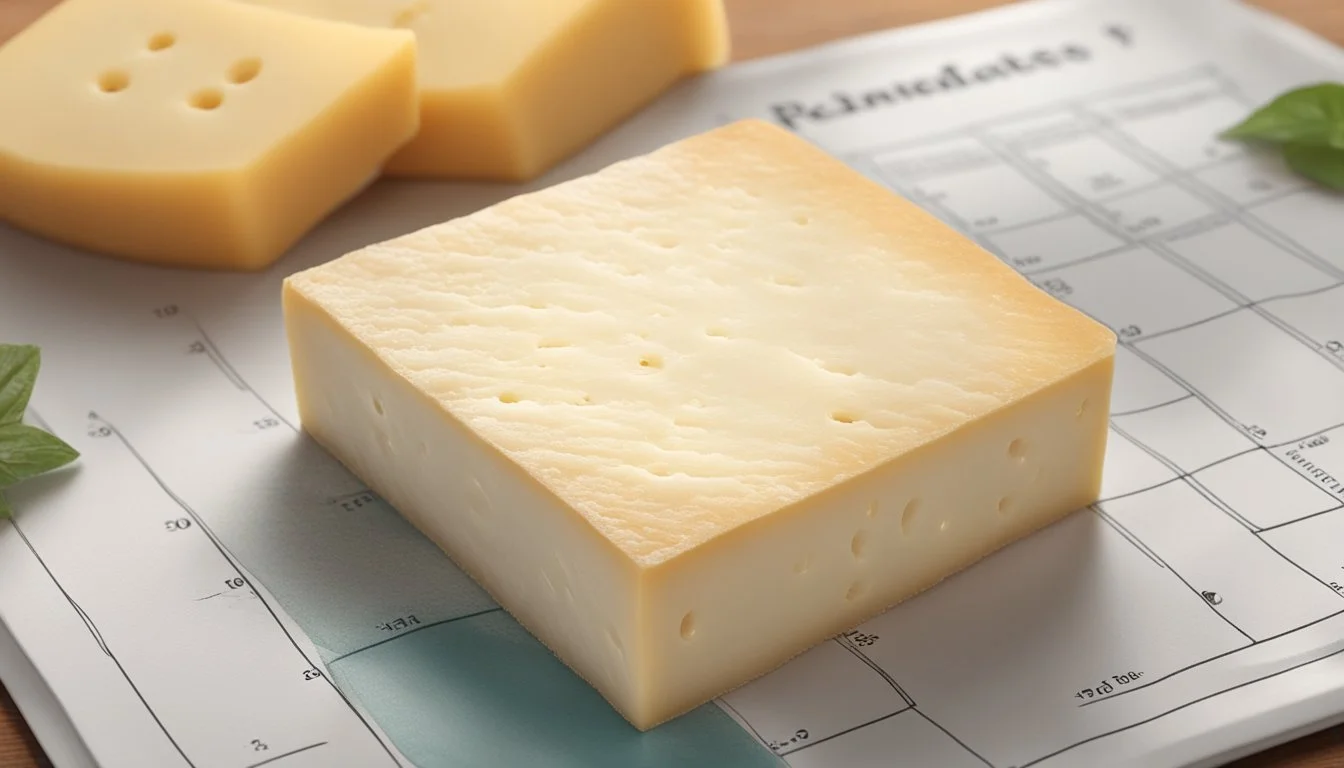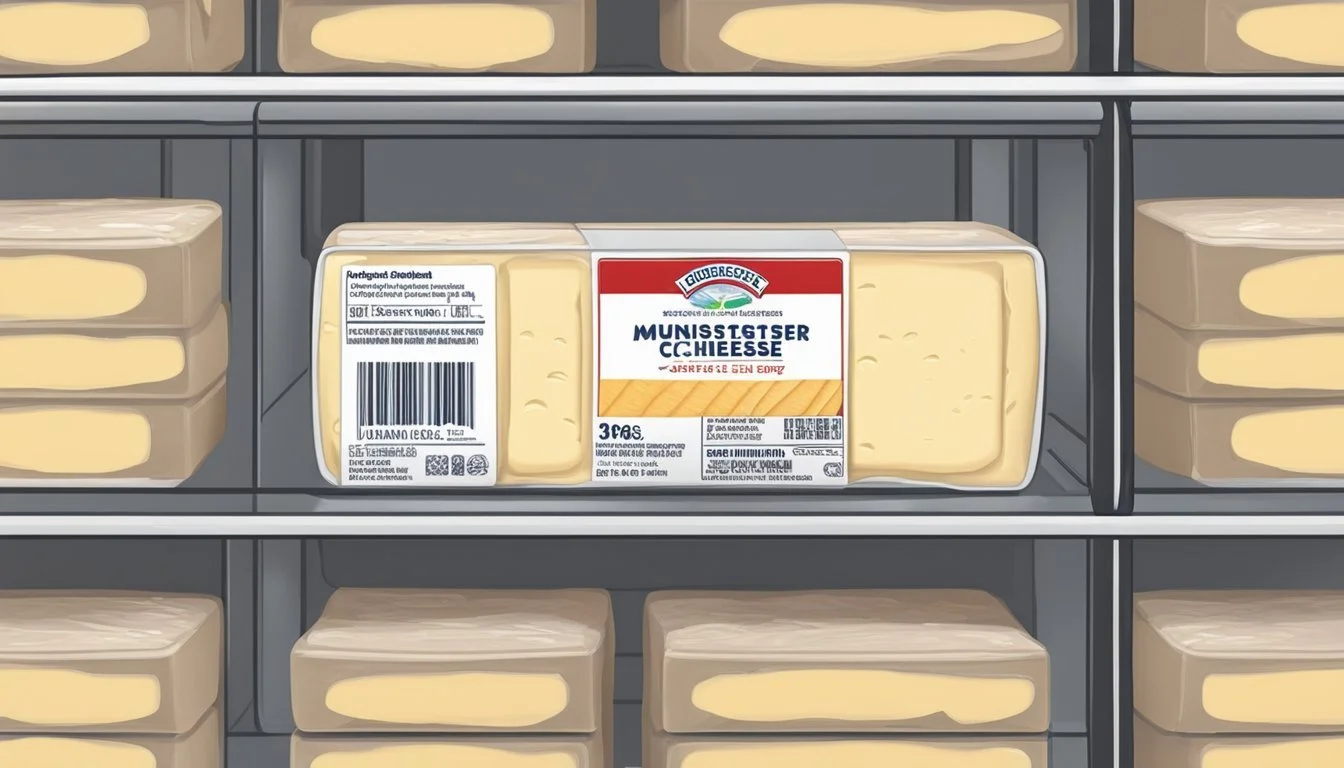How Long Does Muenster Cheese Last?
Shelf Life and Storage Tips
Muenster cheese (how long does cheese last?), with its smooth, creamy texture and mild flavor, stands out as a beloved cheese (What wine goes well with cheese?) choice for many. It is a semi-soft cheese distinguished by its white body and characteristic reddish-orange rind, which is sometimes eaten and sometimes removed depending on personal preference. Known for its versatility, Muenster cheese is not only a staple in sandwiches and burgers but also melts beautifully, making it a popular ingredient in a variety of dishes.
When it comes to preserving the quality of Muenster cheese, proper storage is key. Unopened and stored in the refrigerator, Muenster cheese maintains its quality for 3 to 4 weeks. To ensure the cheese does not dry out or absorb other odors from the refrigerator, it should be kept in an airtight container or wrapped tightly in plastic wrap. If longer storage is necessary, freezing is an option that can extend Muenster cheese's life for up to 3 months without significant loss of quality.
As with any cheese, the texture and flavor of Muenster can change over time. While the cheese is known for its semi-firm texture and mild taste when fresh, these characteristics may subtly alter as the cheese ages. Consumers should always check the expiration date and look for any changes in appearance or smell as indicators of the cheese's condition.
Overview of Muenster Cheese
Muenster cheese, recognized for its mild flavor and semi-soft texture, originates from the Alsace region in France. However, its production has become widespread, with the United States also known for creating this popular cheese variant.
Muenster cheese can be identified by its smooth, creamy consistency and a distinctive reddish-orange rind, usually colored with annatto or paprika. The rind, which is typically edible, enhances the overall aesthetic and taste profile of the cheese.
This cheese varies in smell; it presents a mild scent when fresh but develops a stronger aroma over time. The taste of Muenster cheese is also known to intensify with age, moving from gentle undertones to more pronounced flavors, which appeals to a variety of palates.
Though Muenster cheese boasts an Alsatian origin, its adaptation in the United States has led to a unique interpretation. American versions of this cheese are generally milder compared to their French counterparts, which cater to a different consumer taste preference.
Key Characteristics:
Flavor: Mild, becomes sharper with age
Texture: Semi-soft
Rind: Reddish-orange, often paprika-enhanced
Origin: Alsace region, France, but widely produced in the United States
Muenster cheese complements a diverse range of dishes due to its agreeable flavor. Its melting qualities make it an excellent addition to sandwiches and burgers, marrying well with other ingredients without overpowering them.
Determining Freshness
When assessing the freshness of Muenster cheese, a consumer should examine several factors like appearance, texture, smell, taste, and the provided expiration dates. Each attribute can provide important clues about the cheese's current quality and edibility.
Appearance and Color
Muenster cheese is typically mild white with a distinctive reddish-orange rind made from paprika. Fresh cheese should display a uniform color with no signs of mold. If any discoloration or moldy spots are present, this may indicate spoilage.
Texture and Consistency
The texture of fresh Muenster cheese is smooth and semi-soft. Over time, cheese can become crumbly or excessively hard, suggesting it could be past its prime. If the cheese has lost its pliable texture, it may not provide the optimal culinary experience.
Smell and Odor
A fresh piece of Muenster cheese has a mild smell that intensifies with age. An off-odor is a telltale sign that the cheese may be bad or spoiled. One's senses, particularly the sense of smell, are crucial in detecting any unpleasant odors.
Taste
The initial taste of Muenster cheese is creamy and mild. Should one detect off-flavors or any taste that deviates sharply from a mild creaminess, it may indicate deterioration in quality.
Expiration Dates
Muenster cheese comes with expiration, sell by, or best by dates that should be taken into account. While a sell by date often indicates the last day a product is at its peak quality, the best by date can reflect a recommendation for consuming the product while it's at its best flavor and quality. It is important to verify these dates and use them to guide storage and consumption decisions.
Proper Storage Techniques
Preserving the quality of Muenster cheese hinges on proper storage techniques that manage moisture, limit air exposure, and control temperature and humidity. Consideration of these factors prolongs the cheese's life and maintains its flavor and texture.
Refrigeration
Muenster cheese should be stored in the refrigerator at a steady temperature. Optimal refrigeration is achieved by maintaining the cheese at temperatures of 35°F to 40°F. This cool environment slows down the growth of bacteria, helping the cheese retain its quality.
Ideal Shelf Life: Unopened Muenster cheese can last in the refrigerator for 3-4 weeks.
After Opening: Once opened, the cheese should be consumed within 2-3 weeks for best quality.
Freezing and Defrosting
For extended storage, Muenster cheese can be placed in the freezer. The following points highlight essential freezing and defrosting techniques:
Wrapping: Cheese should be wrapped in parchment paper, followed by an airtight cover like a freezer bag, to protect against freezer burn.
Freezing Duration: Properly wrapped Muenster cheese can be frozen for up to 3 months while maintaining its quality.
Defrosting: Thaw cheese in the refrigerator to slow the defrosting process and help preserve texture.
Packaging and Air Exposure
Initial Packaging: If the cheese's original packaging is unopened, it provides appropriate protection.
Once Opened: After opening, re-wrap the cheese in wax or parchment paper, followed by an additional layer of plastic wrap or aluminum foil to minimize air and moisture exposure that can deteriorate the cheese.
Temperature and Humidity
The ideal temperature for storing Muenster cheese is is cooler than room temperature, but not as cold as a standard refrigerator setting. If you have a storage area like a cellar that maintains temperatures between 45°F to 60°F, it is also suitable for the short-term storage of Muenster cheese. However, consistency in temperature and humidity levels is crucial to prevent spoilage and maintain the quality.
If Cheese is to be Used Soon: It may be kept at room temperature in a device like a cheese grotto for up to 10 days.
For Aging Cheese: An environment like a cellar is preferable to encourage proper aging.
By following these specific storage guidelines, the shelf life of Muenster cheese can be extended, allowing you to enjoy its flavor for a longer time.
Shelf Life of Muenster Cheese
Proper storage significantly impacts the shelf life of Muenster cheese, affecting both its quality and safety for consumption. Considerations include whether the cheese is unopened or opened, the storage method, and potential freezing.
Unopened Packages
When Muenster cheese is unopened, it retains its quality in the refrigerator for up to 3-4 weeks. The expiration date on the package provides guidance, but it should be stored away from light and air exposure to maintain its freshness.
After Opening
Once opened, Muenster cheese should be wrapped tightly in plastic wrap or aluminum foil to reduce air exposure and the chance of absorbing other odors. For optimal quality, store the cheese in the fridge for 2-3 weeks in its original packaging if possible. If not, use wax or parchment paper under the plastic wrap.
Wrapped in plastic wrap or foil – 2 to 3 weeks
Original packaging – Ideal if possible
Frozen Muenster Cheese
For extending shelf life, freezing Muenster cheese is an option. Freeze the cheese by wrapping it in airtight packaging to prevent freezer burn and odor absorption. Frozen Muenster cheese can last for about 3 months without significant loss of quality. Thaw it in the refrigerator for gradual defrosting before use.
Freezing Duration – Up to 3 months
Thawing - In the refrigerator for best results
Signs of Spoilage
When Muenster cheese begins to spoil, it exhibits distinct signs such as mold growth, changes in its physical properties, and alterations in odor and taste. The detection of these signals is crucial to avoid potential health risks associated with consuming spoiled cheese.
Mold Presence
One should closely inspect Muenster cheese for mold, which can appear in various colors including white, green, black, or pink. If mold is visible, one must discard the affected portion immediately to prevent the risk of cross-contamination and potential exposure to harmful bacteria.
Physical Changes
Texture: Spoiled Muenster cheese often becomes either excessively hard or overly soft, losing its characteristic creamy consistency.
Color and Discoloration: Any noticeable change in color or the presence of discoloration that does not align with the natural creamy yellow hue of fresh Muenster cheese indicates spoilage.
Odor and Taste Changes
Smell: A pungent or sour smell that strays from the cheese's mild and slightly earthy aroma is a clear sign of spoilage.
Taste: Off-flavors, such as a bitter or sour taste, are definitive indicators that the cheese has gone bad and should not be consumed.
Usage and Cooking With Muenster Cheese
Muenster cheese is a versatile ingredient known for its smooth texture and mild flavor, which makes it an excellent addition to a variety of dishes, from classic sandwiches to elegant cheese platters.
Culinary Applications
Muenster cheese's adaptability shines in the kitchen, as it melts beautifully, making it a perfect choice for grilled cheese sandwiches, burgers, and casseroles. It holds its shape when melted, which is why it's featured prominently in macaroni and cheese and as a gooey topping for pizzas. Chefs can also incorporate slices or cubes of Muenster cheese into soups to add richness or serve it on a cheese platter paired with ham, beer, or wine.
Handling After Defrosting
If Muenster cheese has been frozen and is then defrosted, it should be used within a short period to maintain the best quality. Once defrosted, it can be used in cooked dishes where texture changes from freezing are less noticeable. Dishes that involve cooking like casseroles, soups, and melted cheese applications like grilled cheese sandwiches are ideal for using defrosted Muenster cheese.
Pairing and Recipes
Muenster cheese's creamy texture and subtle tanginess make it excellent for enhancing recipes. For an easy yet flavor-packed dish, pair it with burgers for a melt that complements both meaty and vegetarian patties. When creating a cheese platter, combine Muenster with complementary flavors like sweet fruits and robust charcuterie. In grilled cheese sandwiches, its melting quality offers a delightful stringiness, and when used in macaroni and cheese, it adds a level of creaminess that enriches the dish.
Nutritional Information
Muenster cheese is a dairy product that provides nutritional value in the form of calories, fat, and protein. It's important for consumers to understand its nutritional content to make informed dietary choices.
Per 100 grams of Muenster cheese, the average caloric content is approximately 368 calories. The fat content is substantial, with about 30 grams of total fat. Out of this total fat, saturated fat accounts for around 19 grams.
In terms of protein, Muenster cheese offers a good amount, providing roughly 25 grams of protein. This protein is high-quality, including all essential amino acids necessary for growth and bodily functions.
For individuals monitoring their diet, it is relevant to note that while Muenster cheese is not lactose-free, it contains lower levels of lactose compared to other dairy products, making it potentially suitable for those with mild lactose sensitivity. It is naturally gluten-free, which is significant for those with gluten-related disorders.
Here is a concise breakdown of the nutritional elements per 100 grams:
Nutrient Amount Calories 368 kcal Total Fat 30 g Saturated Fat 19 g Protein 25 g Lactose Lower levels Gluten Gluten-free
Consumers should consider the presence of both saturated fat and calories in Muenster cheese when integrating it into a balanced diet. In context, its protein and possibly lower lactose levels can complement dietary needs, while its gluten-free nature supports those with specific dietary restrictions.
Comparison With Other Cheese
Muenster cheese's shelf life varies when compared with different types of cheeses, mainly based on texture and processing methods. This section offers a clear, side-by-side evaluation of how Muenster cheese stacks up against other varieties.
Versus Other Semi-Soft Cheeses
Muenster Cheese, a semi-soft cheese known for its mild flavor and creamy texture, typically lasts up to 3-4 weeks in the refrigerator. In comparison, semi-soft cheeses like Havarti and Gouda have a slightly longer fridge life, often enduring for about 2-3 months due to their distinct textures and slightly different moisture contents.
Versus Hard Cheeses
Contrastingly, hard cheeses such as Parmesan and Gruyère, due to their lower moisture content and denser texture, can have a significantly extended shelf life, ranging anywhere from several months to over a year when stored properly in the refrigerator. For example:
Cheddar: Lasts about 2-4 months in the refrigerator after opening.
Parmesan: Can last up to 6 months in the refrigerator, or longer if unopened.
Natural Cheese Versus Processed Cheese Comparison Natural cheeses like Muenster and its counterparts are often less stable than processed cheeses due to the absence of preservatives. Processed cheese, with additional ingredients to extend shelf life, can last beyond a natural cheese’s expiry, sometimes maintaining quality for several months. For instance:
Natural Muenster Cheese: Lasts up to 3-4 weeks in the refrigerator.
Processed American Cheese: Can last for several months due to preservative content.
Health and Safety Considerations
When discussing the health and safety considerations of Muenster cheese, it's important to address lactose content, potential allergies and intolerances, as well as strategies for preventing foodborne illness. Proper storage and awareness of the cheese's properties will aid in maintaining its safety and quality.
Lactose Content and Digestibility
Muenster cheese, like other dairy products, contains lactose, a sugar that some individuals have difficulty digesting. While the lactose content may be lower in aged cheeses (What wine goes well with aged cheeses?), those with lactose intolerance should be aware of their body's reactions to Muenster cheese. Lactose-free alternatives are advisable for those who are intolerant.
Allergies and Intolerances
Apart from lactose intolerance, some individuals may have allergies to the proteins found in Muenster cheese. Cross-contamination with other allergens is possible, so it's crucial to handle Muenster with care, especially when it is served or sold alongside gluten-containing products or other allergens.
Foodborne Illness Prevention
Muenster cheese must be stored properly to minimize health risks associated with bacterial growth. Here are key points:
Store at 40°F (4°C) or below in the refrigerator
Wrap tightly in plastic wrap or in an airtight container
Observe usage within 2-3 weeks after opening to reduce the risk of foodborne illness Avoiding cross-contamination is essential; always use clean utensils when handling the cheese, and separate from raw foods that may carry bacteria.
Shopping and Selection Tips
When selecting Muenster cheese, consumers should pay attention to several key quality indicators. Packaging is paramount; it should be intact and well-sealed to ensure freshness. It's best to avoid packages that have any tears or openings that could have led to premature exposure to air.
Color and texture offer visual cues about the cheese's condition. Muenster cheese typically displays a pale yellow color with a smooth, creamy texture. If the cheese presents any discoloration or dryness, it may suggest that it has begun to age beyond its ideal point of consumption.
The smell is also an essential factor — Muenster cheese should have a mild, not overpowering aroma. Any strong or sour smells could indicate spoilage.
When examining Muenster cheese, one should not ignore the rind. The rind, usually colored with annatto to a reddish-orange, can be eaten, but it's a matter of personal preference whether to cut it off before eating.
It's crucial to check the best by date on the packaging; while Muenster cheese can generally last for about 3-4 weeks in the fridge, this date provides a good reference point for its anticipated shelf life.
Below is a checklist for choosing the best quality Muenster cheese:
Well-sealed, intact packaging
Pale yellow color, creamy texture
Mild aroma
Edible rind with a uniform reddish-orange hue
Clear and upcoming best by date
Shoppers should store the cheese properly upon returning home from the market. Tight wrapping in plastic or wax paper and refrigeration will help maintain the cheese's taste and texture for the duration of its shelf life. If long-term storage is necessary, one can freeze Muenster cheese, although this may slightly alter its texture.
Frequently Asked Questions
How long can one store Muenster cheese in the refrigerator?
Typically, unopened Muenster cheese lasts in the refrigerator for 3-4 weeks. It is advisable to store the cheese in an airtight container or wrap it in plastic wrap to maintain its quality.
Can Muenster cheese be frozen for extended storage?
Yes, Muenster cheese can be frozen to extend its shelf life. When properly stored in the freezer, it can retain quality for up to 3 months. To freeze, one should wrap the cheese tightly to prevent freezer burn.
What are the signs that Muenster cheese has gone bad?
Indicators of spoilage include sour smell, off-flavor, and visible mold growth. If the cheese exhibits any of these signs, it should not be consumed.
Does the expiration date on Muenster cheese packaging matter?
Yes, the expiration date is important as it suggests the timeframe for best quality. Beyond this date, the quality may decline, even though the cheese might still be consumable if no signs of spoilage are present.
How should one wrap Muenster cheese for refrigerator storage?
For optimal results, wrap the original packaging of the opened Muenster cheese in wax or parchment paper, and then in plastic wrap or aluminum foil before refrigerating.
Is it possible for Muenster cheese to absorb odors from other foods?
Muenster cheese can absorb strong odors from nearby foods. To prevent this, it must be stored securely wrapped and separated from foods with strong odors.
Conclusion
Muenster cheese, appreciated for its mild flavor and creamy texture, maintains its quality when stored properly. In the refrigerator, it has a shelf life of 3-4 weeks if kept unopened. Once opened, the cheese should be wrapped in an airtight manner, preferably first in wax or parchment paper, then in plastic wrap to ensure longevity.
For extending shelf life beyond the typical refrigerator scenario, freezing is a viable option. Frozen Muenster cheese can last for up to 3 months while preserving its quality, though some textural changes may occur upon thawing.
To avoid spoilage, one should always store Muenster cheese at a consistent temperature, within the range of 34°F to 40°F. The following bullet points summarize essential storage practices:
Store unopened Muenster cheese in the fridge for up to 3-4 weeks.
Upon opening, rewrap in wax/parchment paper, then plastic wrap and use within 2-3 weeks.
If freezing, expect a shelf life extension to approximately 3 months.
Consistently maintain storage temperature between 34°F to 40°F.
These measures help retain the cheese's desirable characteristics and prevent it from absorbing other odors or drying out. Adherence to these guidelines ensures that the Muenster cheese served will be flavorful and of high quality.













